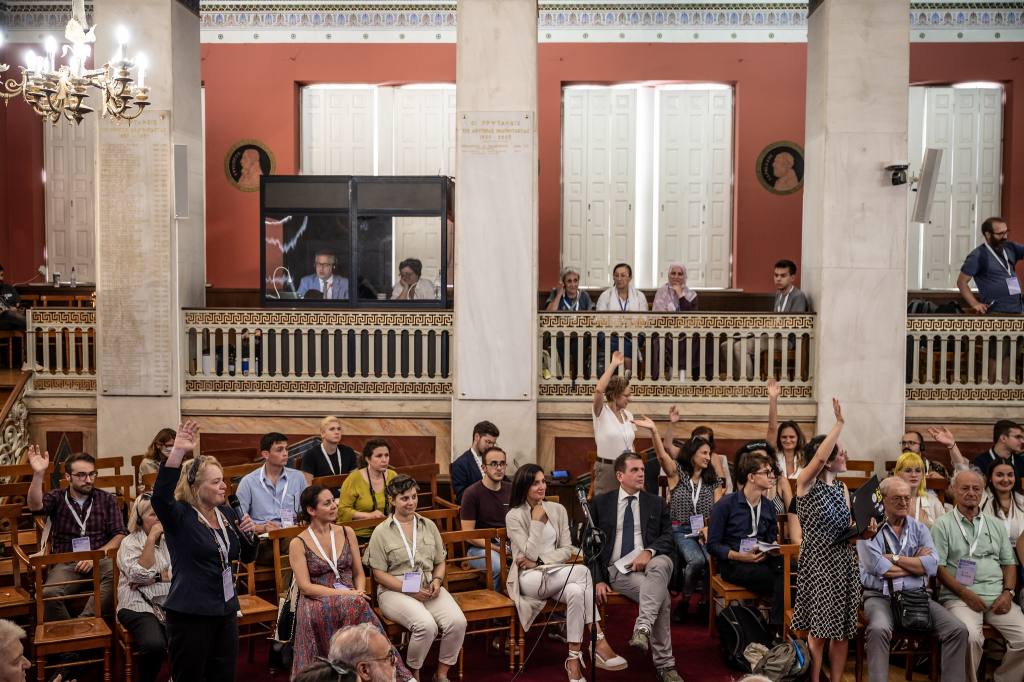
We, representatives of civil society, NGOs, members of Citizens Take Over Europe and defenders of democratic values, welcome the establishment by the European Parliament of the Special Committee on the European Democracy Shield. At a moment of geopolitical reorganisation and rupture, it is urgent for the European Parliament to assert its role as a home of democracy in Europe, and we believe that such a Special Committee, working together with the other Committees and intergroups of the Parliament, can mainstream democratic values and practices across all areas of European Union policy making, as well as make recommendations on reinforcing democracy at all levels of European governance, including in accession countries.
We believe that the European Institutions cannot defend democracy alone. European democracy will be most resilient and vibrant when citizens and residents of Europe can participate regularly in it. Elections are a central moment of democratic expression, but they cannot be the only moments of participation: citizens assemblies, petitions, ECIs, participative budgeting and civil society activity all have crucial roles in making democracy an ongoing lived experience of people across the continent, as well as being tools that can make policy making better informed and build trust in institutions.
We call on the Special Committee to make the following topics central to its work:
- Defending Civil society participation
The committee must listen to and work with democratic civil society organisations active on the ground throughout Europe, both inside the EU and in neighbouring countries, who know most directly the difficulties and risks of defending democracy and promoting democratic values. Civil society organisations, youth organisations, educators and researchers should all be involved in the work of the committee to build a stronger working methodology across the European parliament with pro-democratic and pluralist civil society.
2. Ensuring Media freedom and pluralism
The European Media Freedom Act is an essential step in the European Union taking a stronger role in ensuring a diverse and high quality public sphere for democracy at a time when threats against journalists, monopoly control of media organisations, dominance of the advertising market and interference from malicious external states continue to proliferate. As media models adapt to the digital age, the European Union must ensure that high quality and independent media multiply and can use the possibilities of increased public participation in media production to reinforce truthfulness, quality of information and a critical approach. In line with Proposal 27 of the Conference on the Future of Europe, media literacy must be promoted. Public interest journalism must be safeguarded from state capture, oligarchic control and disinformation.
3. Regulation of social media
We are witnessing unprecedented levels of foreign interference in European politics, through social media, money and political interventions of members of foreign administrations. Corporate owned and state owned social media, including X and Tiktok, are posing serious threats to democratic values in Europe, both through direct attempts at influence of elections and through deliberate degrading of the quality of public deliberation. The European Union should take decisive action to prevent these attacks, ensuring these social media adapt their models to meet the highest standards of independent oversight, fact-checking, the prevention of hate-speech and discrimination, avoiding conflict of interest, and non-manipulation of algorithms for the purposes of political interference.
4. Transparency and Accountability
The special committee should look to measures that increase transparency in all decision-making processes and in the use of public funds, at all levels of the governance in Europe including in the European Union and should address the influence of corporate lobbies in EU policy making.. Transparency and accountability are conditions for ensuring the trust of citizens in their institutions, and the European Union should be exemplary in this regard.
5. Citizens assemblies
Elections are a central part of the democratic model in Europe, but they cannot be the only form of political participation. Randomly selected citizens assemblies provide tried and tested ways of bringing a greater diversity of voices into the policy process, undermining the influence of corporate lobbies, and bringing clarity to political divisions and trade offs. Transnational citizens assemblies have only started to be tested in the Conference on the Future of Europe process and in the Citizens Panels, and the European Parliament could push forward innovation in ways citizens can be brought together democratically across borders.
6. Defending democracy both inside and outside the EU
The EU’s democratic model and norms is under threat both from malicious external and internal actors, and these actors work together in networks which function efficiently and effectively. The Committee on the Defence of Democracy needs to take a holistic approach to the threats against democracy and acknowledge these threats also come from governments inside the EU. It is no accident that some of the biggest cheerleaders for the Georgian Dream Party stealing the election, or a bilateral settlement between Trump and Putin over the future of Ukraine which cuts out the Europeans and Ukrainians, are also some of the most illiberal and undemocratic governments in the EU.
We believe that these and other topics are of such importance to the future of democracy in Europe that the work of the special committee should be extended beyond one year across the 5 year mandate of this Parliament, and that other parliamentary committees should also work on the specific ways democracy relates and can be reinforced in each policy area. On the basis of solid and sustained work on this urgent topic European democracy can not only be defended by extended and deepened across our continent.


